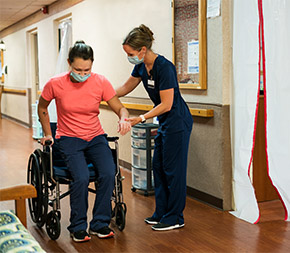
Nursing
Nursing is a medical profession and nurses are mainly involved in taking care of the patients and helping them to recover from an ailment. Nursing profession is one of the noblest professions in the world. It is the art of caring for patients with health research. It is an integral aspect of all forms of healthcare. The largest demographic of health staff are nurses. Nursing is an integral component of a hospital, and the nurses are involved right from the administrative office to the operation theatre in a hospital. This is one of the few fields of employment where women dominate nearly completely. Nursing offers a wide range of specialty areas, including critical care, pediatric nursing, psychiatric nursing, surgical nursing, and more. Nurses can choose to specialize in areas that align with their interests and skills. Some nurses are involved in research to advance the field of nursing and improve patient care. They contribute to the development of evidence-based practices and healthcare policies. Nurses can take on leadership roles within healthcare organizations, such as nurse managers, nurse educators, or nurse administrators. They are responsible for managing teams, budgets, and healthcare programs. Nursing is a demanding but highly rewarding profession that requires compassion, critical thinking, communication skills, and the ability to adapt to changing healthcare environments. Nurses have a significant impact on patients' lives and the overall healthcare system, making their role indispensable in promoting health and wellness within society.
Role Desciption
Here's an overview of the role of nurses:
1. Patient Care: At the core of nursing is the provision of patient care. Nurses work closely with patients in various healthcare settings, including hospitals, clinics, nursing homes, and home healthcare. They assess patients' health conditions, administer medications, monitor vital signs, and provide treatments as prescribed by healthcare providers.
2. Advocacy: Nurses serve as advocates for their patients, ensuring that their rights and needs are respected and met. They communicate with other healthcare professionals on behalf of the patient to provide the best possible care.
3. Education: Nurses educate patients and their families about their health conditions, treatment plans, and self-care techniques. They help patients understand their diagnoses and provide guidance on managing their health after leaving the healthcare facility.
4. Assessment and Monitoring: Nurses are responsible for continuously assessing and monitoring patients' physical and emotional well-being. They observe any changes in a patient's condition, report them to the healthcare team, and take appropriate actions to address emergent issues.
5. Medication Management: Nurses administer medications, track patients' responses to treatments, and ensure that medications are administered safely and in accordance with physicians' orders.
6. Wound Care: In various healthcare settings, nurses are responsible for wound care, including cleaning, dressing, and monitoring wounds to promote healing and prevent infection.
7. Collaboration: Nurses collaborate with physicians, therapists, pharmacists, and other healthcare professionals to develop and implement patient care plans. Effective teamwork is crucial in providing comprehensive care.
8. Emotional Support: Nurses provide emotional support to patients and their families during challenging times. They offer comfort, empathy, and reassurance to help patients cope with illness, pain, and stress.
9. Health Promotion and Prevention: Nurses play a vital role in health promotion and disease prevention. They educate patients and communities about healthy lifestyles, immunizations, and strategies to prevent illnesses.
Eligibility
| Route | 10 + 2 in any Stream |
| Diploma in Auxiliary Nursing Midwifery (ANM) for 2 years | |
| Diploma in General Nursing and Midwifery (GNM) for 3 years | |
| Bachelor of Science in Nursing for 2 years( post basic) | |
| Route 2 | 10 + 2 in Science Stream with Biology |
| General Nursing and Midwifery (GNM) for 3 years | |
| Bachelor of Science in Nursing for 2 years( post basic) | |
| Route 3 | 10 + 2 in Science Stream with Biology |
| Bachelor of Science in Nursing for 4 years | |
| Master of Science in Nursing for 2 years |
Significant Statistics
- Minimum 50% in 10+2 to get admission at various colleges
- Some colleges accept students with minimum 60% in 10+2
- 10+2 with English subject is must
- Age limit is fixed by some colleges or universities at 17 years
Pros/Cons
Pros
- One of the noblest professions
- Wide career options for nursing qualified professionals
- Cost of education is less and the returns are quite high
Cons
- Nursing is very challenging profession as the professionals are exposed to patients infected by various viruses
- Rotating shifts and long working hours can make the job frustrating
- Lot of emotional balance need to be maintained to get through daily work at hospitals
Leading Professions
View All
Medical Surgical Nurse
Medical Surgical nurses ...
10.0LPA

Neuroscience Nurses
Neuroscience Nurses are ...
5.0LPA

Oncology Nurses
Oncology Nurses are resp...
4.0LPA

Cardiovascular Nurses
Cardiovascular Nurses wo...
5.0LPA

Orthopedic Nurses
Orthopedic nurses take c...
3.0LPA

Psychiatric and Mental Health Nurses
Psychiatric and Mental H...
6.0LPA

Rehabilitation Nurse
Nurses working in rehabi...
8.0LPA

Critical care Pediatric Nurses
Critical care pediatric ...
4.0LPA
CAREER VIDEOS
Career Path
Nursing
3 Steps
Skills
Recruitment Area
educational institutes ,
Hospitals ,
Clinics ,
Old Age homes ,
health centres ,
Medical Institutes ,
orphanages ,
Sports centers ,
Public & Private companies .
Recruiters
AIIMS ,
PGI ,
Apollo ,
IVY ,
Fortis ,
Max hospitals ,
NCL ,
KDMC ,
ICSIL ,
NHM ,
NASHA MUKTI KENDRA .
Explore Colleges
Exams & Tests
Interested? Take the next step for this career
Nursing
- 3 Steps
Skills Needed
Exams and Tests
Recruitment Area
educational institutes ,
Hospitals ,
Clinics ,
Old Age homes ,
health centres ,
Medical Institutes ,
orphanages ,
Sports centers ,
Public & Private companies .
Recruiters
AIIMS ,
PGI ,
Apollo ,
IVY ,
Fortis ,
Max hospitals ,
NCL ,
KDMC ,
ICSIL ,
NHM ,
NASHA MUKTI KENDRA .



















